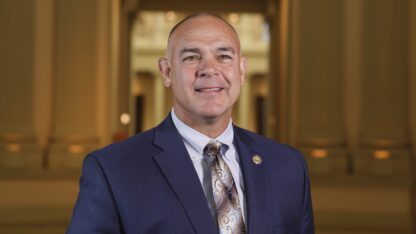Joy Kramer was diagnosed with lymphoma 13 years ago. She recovered a year later and remains cancer-free today at 59.
But for years after her treatment, Kramer fought to get affordable insurance. Her premiums and deductibles soared because of her pre-existing medical condition. For a while she gave up, going uninsured for several months.
The Affordable Care Act drastically changed things.
First Kramer qualified for a Pre-Existing Condition Insurance Plan that lowered the cost of her coverage. Then in 2014 came the full implementation of the ACA, which prohibited insurers from denying coverage or charging higher premiums to consumers with pre-existing health conditions.
Kramer, a Smyrna marketing consultant, signed up for the state’s insurance exchange. “I felt like a weight had been lifted,’’ she recalls.
Now a lawsuit threatens to return Kramer and millions of others with health conditions to that pre-Obamacare insurance jungle.
Twenty states, including Georgia, are challenging the ACA and its constitutionality in court. Last week, in reference to that suit, the Trump administration told a federal court in Texas that it would not defend provisions in the ACA that protect people with pre-existing medical conditions.
The Justice Department argued that the pre-existing condition protections for consumers cannot be separated from the unpopular requirement that most Americans obtain insurance. But since Congress repealed the tax penalty tied to that insurance mandate, that requirement and the law’s consumer protections can no longer be constitutional, the Justice Department said.
The three-page letter from Attorney General Jeff Sessions related to the lawsuit begins by saying that Justice adopted its position “with the approval of the President of the United States.” The letter notes that it is not standard practice for a presidential administration to decline to defend a law, but that it is sometimes done. (Most recently, President Barack Obama’s administration took this step in 2011.)
The Trump administration’s argument comes despite the continuing popularity of the pre-existing condition rules.
A Kaiser Family Foundation poll a year ago found that seven in 10 Americans said the federal government should continue to prohibit health insurance companies from charging individuals with pre-existing health conditions more for their coverage. One-fourth (26 percent) said states should be able to decide whether insurers can charge people with pre-existing conditions more.
A majority of Democrats (84 percent), independents (68 percent), and Republicans (59 percent) want continued federal protection for people with pre-existing conditions, according to the June 2017 poll.
Dropping those protections, Kramer said, “would be very much a death sentence for a lot of people, just like before Obamacare.”
Georgia’s attorney general, Chris Carr, joined the multistate lawsuit in February.
“The Affordable Care Act’s design was constitutionally flawed at the outset,” said Carr in a statement at the time. “Our office has pushed back against this overt form of federal overreach from the beginning, and we will continue to work with other states to see that it is resolved in a way that protects the interests of our citizens.”
A definitive court ruling in the lawsuit could be months away and appeals of any decision could take many more months, during which the law is likely to stay in effect, the New York Times reported.
If the judge buys the administration’s argument, and if his ruling is upheld on appeal, 52 million Americans with pre-existing conditions could face denial of coverage or higher premiums, Timothy Jost, health policy expert at Washington and Lee University School of Law, wrote in a post for the Commonwealth Fund.
“The administration’s argument would also allow insurers to charge women, older people, and people in certain occupations higher premiums,’’ Jost wrote. “This policy change would jeopardize coverage not just for consumers in the individual market, but also people with pre-existing conditions who have employer-sponsored coverage. If these people lost or left their jobs, they may not be able to get individual market coverage.”
California and 15 other states have intervened in the court proceeding, filing a brief defending the ACA, including its consumer protections.
Administration officials pointed out that the Justice Department filing said other parts of the health law would continue to stand, including its Medicaid expansion covering about 12 million low-income people, the Times reported.
Bill Custer, a health insurance expert at Georgia State University, said that if other parts of the Affordable Care Act would remain without the consumer provisions, “we’ll have a very weird market.’’
And stripping the pre-existing condition protections, he said, would make the insurance market “look like the market prior to the Affordable Care Act.’’
It would boost the number of people without health insurance, and the uninsured would generally be sicker, Custer said.
Employer plans would become more expensive, he said. That’s because people with health conditions, or those who have dependents with such medical histories, would strive to work for big companies, whose health plans don’t differentiate on medical conditions.
The dramatic turn in the 20-state lawsuit, meanwhile, occurs as insurance companies are readying their proposed premiums for the 2019 exchanges.
“Insurance companies hate uncertainty, and when they face uncertainty they tend to increase premiums and hedge their bets,” said Larry Levitt of the nonpartisan Kaiser Family Foundation, according to the Associated Press.
America’s Health Insurance Plans, an industry trade group, said the Justice Department’s stance could upset a market that is becoming “more steady” for most consumers.
“Zeroing out the individual mandate penalty should not result in striking important consumer protections,” the group said, the AP reported. It will lead to “renewed uncertainty in the individual market” and a “patchwork of requirements in the states” and make it more challenging to offer coverage next year.
Kramer is feeling that uncertainty even now. Through what she calls a payment mix-up, her exchange coverage recently lapsed. She has appealed that decision.
In the long term, a much worse scenario would occur if the pre-existing condition protections go away, she said.
“The insurance companies will probably drop a large number of people,’’ said Kramer.
“Cancer isn’t a Democrat or Republican issue. It’s just a human issue.”
Andy Miller is editor and CEO of Georgia Health News







